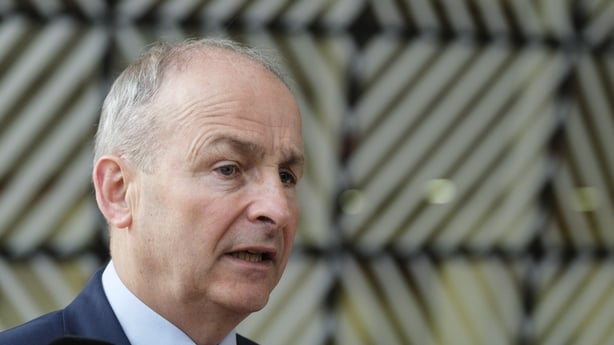The Taoiseach has told the Dáil that Government legislation addressing the Triple Lock on the deployment of the Defence Forces overseas will "absolutely protect Ireland's neutrality".
"Ireland's neutrality is not at risk," Mr Harris said.
The current Triple Lock mechanism only allows for the deployment of more than 12 troops overseas if there is a United Nations mandate, either from the Security Council or General Assembly, alongside Government and Dáil approval.
The Taoiseach said that no new UN peacekeeping force has been approved in a decade.
He said this is a result of "the increased use of the threat of the use of the veto by permanent members of the UN Security Council".
He was responding to People Before Profit TD Bríd Smith who said that, since the Triple Lock was introduced alongside the Nice Treaty in 2001, a veto has never been used to block a peacekeeping deployment.
"So it is a distortion to say that that is the reason," she said.
"Whatever it takes, you are trying to drag Ireland into a pact with EU militarisation."
Ms Smith demanded that the Programme for Government be adhered to, or a referendum held on keeping neutrality "fully intact".
Her party colleagues, Richard Boyd Barrett and Paul Murphy, also strongly voiced their objections to removing the Triple Lock.
Sinn Féin leader Mary Lou McDonald told the Dáil that "we need to nail this nonsense" that the Government is "trying to peddle, that somehow, removing the need for a UN mandate is a minor modification of the triple lock neutrality protection".
Rather, she insisted, it "is to fundamentally undermine and change the policy of military neutrality" .
"You don't have the democratic mandate to do," she said.
"No fancy footwork" can change these facts, Ms McDonald added.
Mr Harris responded that it is "entirely possible" to be military neutral without need for recourse to the UN Security Council and the countries on it which he does not believe should have a veto.
He urged that people wait to see what the Government is proposing before making any judgements, adding that he values neutrality.

Threat of a veto
It comes as Tánaiste Micheál Martin is seeking Government permission to draft a bill to change how the Defence Forces are deployed on peacekeeping missions overseas.
The Consultative Forum on International Security Policy last June discussed the issue of UN peacekeeping and the Triple Lock.
Under the UN Charter, the Security Council has primary responsibility for the maintenance of international peace and security.
The Security Council may establish a UN peace mission, or authorise action by a group of states or regional organisations, such as the European Union or the African Union.
The five permanent members of the Security Council - China, France, Russia, UK, US - each have a veto on peacekeeping operations.
The Government believes that in practice this means the threat of a veto by a permanent member, is often enough to prevent the Council from taking action.
The UN General Assembly cannot approve a peacekeeping operation.
The Tánaiste is of the view that there is a growing need to be able to dispatch Irish troops quickly to respond to any crisis where Irish citizens require assistance abroad.
This would require legislative changes, but the Tánaiste was set to tell colleagues that any deployment would still have to receive approval from the Government and Dáil.
Mr Martin was also set to say that it will not change Ireland's traditional position of military neutrality.
In the case of evacuations of citizens, the Emergency Civil Assistance Team (ECAT) were deployed to Kabul in 2021 and to Sudan in 2023.
The new legislation will look at these types of deployments to provide clarity on the numbers that can be dispatched.
It will also look to simplify authorisation for Ireland to participate in international live military exercises, such as around the EU's Common Security and Defence Policy.
If the Government approve the drafting of the General Scheme of a bill, the Tánaiste intends to bring legislation to Government in June.
Read/watch more:
Watch: What is Ireland's Triple Lock mechanism
Where did Ireland's Triple Lock come from?







